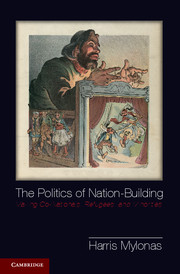Book contents
- Frontmatter
- Contents
- List of Figures, Maps, Tables, Graph, and Illustrations
- Acknowledgments
- List of Abbreviations
- Preface
- 1 Introduction
- Part I Theory
- Part II Empirical Evidence
- 3 Why the Balkans?
- 4 Cross-National Variation
- 5 Odd Cases
- 6 Subnational Variation
- 7 Temporal Variation
- 8 Application of the Theory Beyond the Balkans
- 9 Conclusion
- Methodological Appendix
- References
- Author Index
- Historical Name Index
- Subject Index
- References
7 - Temporal Variation
Serbian Nation-Building toward Albanians, 1878–1941
Published online by Cambridge University Press: 05 January 2013
- Frontmatter
- Contents
- List of Figures, Maps, Tables, Graph, and Illustrations
- Acknowledgments
- List of Abbreviations
- Preface
- 1 Introduction
- Part I Theory
- Part II Empirical Evidence
- 3 Why the Balkans?
- 4 Cross-National Variation
- 5 Odd Cases
- 6 Subnational Variation
- 7 Temporal Variation
- 8 Application of the Theory Beyond the Balkans
- 9 Conclusion
- Methodological Appendix
- References
- Author Index
- Historical Name Index
- Subject Index
- References
Summary
[F]or us Serbs Kossovo is much less a geographical and strategical term than a term of our national psychology, a term announcing a historical synthesis, proclaiming to the world that the Serbs have been able to transform a military defeat into a moral victory, to develop a national tragedy into a national glory.
We have explored the explanatory power of my argument across the Balkan states immediately following World War I and probed it at the subnational level in one Greek province during and after World War I, but how well does my argument explain variation over longer periods of time? In this chapter, I trace the logic underlying the policies followed by the Serbian ruling political elites toward the Albanians in Toplica and Kosanica at the end of the nineteenth century and in Kosovo and Metohija from 1912 to 1941. I test my theory against archival material, secondary sources, and memoirs, as well as available newspapers and journals from the period under study. I find that nation-building policies were not chosen based on objective measures of cultural distance, non-core group preferences, domestic political developments in the host state, or deep-rooted ethnic hatred between the non-assimilated and the core-group but rather based on a combination of other factors: the level of danger of secessionist claims by externally backed non-core group elites as perceived by the host government, bilateral state relations of the latter with the external power supporting the group, and the foreign policy goals of the host state.
Studying Serbian policies toward Albanians for a period of fifty years allows me to keep important regional-, state-, and group-level characteristics constant and isolate the effect of my main variables of interest. The region experienced successive annexations and the Albanian population residing there was exposed to a variety of nation-building policies, ensuring variation in both my dependent and independent variables. Many historians and political analysts read this period – if not the whole modern history of Serb–Albanian relations – as a period of repression and do not analyze the fluctuations in policy. I offer a novel interpretation of events.
- Type
- Chapter
- Information
- The Politics of Nation-BuildingMaking Co-Nationals, Refugees, and Minorities, pp. 142 - 169Publisher: Cambridge University PressPrint publication year: 2013



